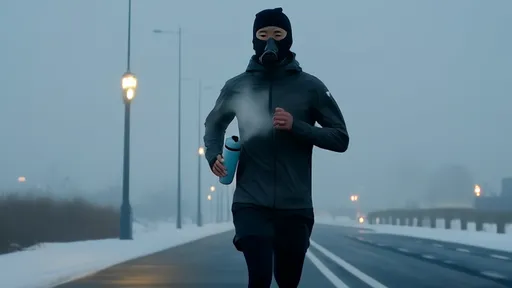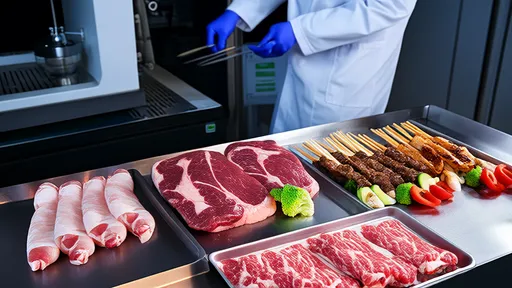The sizzle of skewers on open flames and the aromatic smoke wafting through night markets have long been hallmarks of urban street food culture. Yet behind these tantalizing scenes lies a growing concern among health authorities and consumers alike: the safety of ingredients used in roadside barbecue stalls. Recent foodborne illness outbreaks linked to contaminated skewered meats have sparked nationwide scrutiny over informal food vendors' supply chains and handling practices.
Local health inspectors in multiple provinces have begun conducting surprise raids on popular barbecue hubs, collecting samples of marinated meats, seafood, and vegetables for laboratory analysis. Preliminary findings reveal alarming patterns – nearly 38% of tested samples showed bacterial counts exceeding national safety standards, with some containing traces of prohibited preservatives. "The problem isn't just about expired meat," explains Dr. Liang Wei, a food microbiologist at Shanghai Jiao Tong University. "We're finding artificial colorants in lamb skewers, formaldehyde in seafood, and poultry injected with sodium tripolyphosphate to retain water weight."
Vendors often source ingredients from wholesale markets where pricing pressures lead to questionable procurement choices. A three-month undercover investigation by Food Safety Weekly documented how some suppliers repackage and re-date expired frozen meats specifically for the street food sector. These products get heavily seasoned with cumin, chili, and MSG-laden marinades that mask off-flavors and potential spoilage.
Temperature abuse emerges as another critical hazard. During sweltering summer months, researchers observed raw meats left unrefrigerated for six hours or longer at 82% of surveyed stalls. "The danger zone between 4°C and 60°C creates ideal conditions for pathogen proliferation," warns Dr. Liang. "When vendors partially cook skewers then leave them sitting before final grilling, they're essentially incubating bacteria."
Regional differences in oversight complicate the issue. While first-tier cities have implemented vendor registration systems and periodic inspections, enforcement remains inconsistent in smaller municipalities. Many mobile barbecue operators lack proper business licenses or food handling certifications, operating in regulatory gray areas. A vendor in Chongqing who identified himself as Old Wang admitted, "We move locations every few weeks when inspectors come around. The good spots are near bars where drunk customers don't ask questions."
Consumer awareness campaigns have started gaining traction, with viral social media posts teaching people to identify suspiciously low-priced skewers or meats with unnatural coloration. Food safety NGOs recommend choosing stalls where ingredients are refrigerated and cooked to order rather than pre-skewered. "Look for vendors who wear gloves, use separate utensils for raw and cooked items, and maintain clean work surfaces," advises nutritionist Mei Lin. "If they won't let you see their prep area, walk away."
The economic realities of street vending create inherent tensions between safety and profitability. With profit margins often below 20%, many operators resist investing in refrigeration or premium ingredients. Some provincial governments have begun pilot programs providing subsidized mobile food carts with built-in chillers and standardized cooking equipment. Early data suggests these measures reduce contamination rates by nearly 60% while increasing vendor incomes through higher customer trust.
Technological solutions are emerging to bridge the oversight gap. Several cities now require QR code labeling on all commercial meat purchases, allowing consumers to scan and verify sourcing information. Blockchain-based supply chain tracking for street food ingredients is being tested in Hangzhou, creating immutable records from slaughterhouse to skewer. "Transparency transforms behavior," notes tech entrepreneur Zhao Min whose company developed a popular vendor-rating app. "When customers start choosing stalls based on visible safety metrics, the whole ecosystem improves."
Traditional marinades and cooking methods themselves may offer unexpected safeguards. Research from Shandong University found that certain spice blends used in Xinjiang-style barbecue naturally inhibit bacterial growth. The combination of garlic, onion, and Sichuan peppercorns in typical rubs creates antimicrobial effects that complement proper cooking temperatures. "Cultural wisdom often aligns with scientific principles," observes culinary historian Professor Zhang Yi. "The problem arises when modernization cuts corners on these time-tested practices."
As summer peak season approaches, health authorities are rolling out targeted interventions. High-traffic night markets in Guangzhou and Chengdu will host mobile testing units where consumers can submit skewers for immediate bacteria screening. Provincial quality control bureaus have announced stricter penalties for vendors caught using illegal additives, including potential criminal charges for repeat offenders. Meanwhile, consumer advocacy groups continue pushing for centralized commissary kitchens where vendors could safely prepare ingredients under supervision.
The enduring popularity of street barbecue ensures this issue won't disappear with crackdowns alone. Solutions must balance cultural traditions with modern food safety standards, recognizing that these stalls represent livelihood for millions. As Dr. Liang summarizes, "The goal isn't to eliminate street food culture, but to evolve it in ways that protect both public health and culinary heritage." With coordinated efforts from regulators, vendors, and consumers, the night market experience may yet become as safe as it is flavorful.

By /Jul 28, 2025

By /Jul 28, 2025

By /Jul 28, 2025

By /Jul 28, 2025

By /Jul 28, 2025

By /Jul 28, 2025

By /Jul 28, 2025

By /Jul 28, 2025

By /Jul 28, 2025

By /Jul 28, 2025

By /Jul 28, 2025

By /Jul 28, 2025

By /Jul 28, 2025

By /Jul 28, 2025

By /Jul 28, 2025

By /Jul 28, 2025

By /Jul 28, 2025

By /Jul 28, 2025